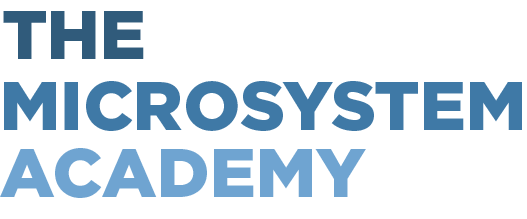About Us /
Our Expertise
DEVELOPING SUCCESS CHARACTERISTICS AND IMPROVEMENT CAPABILITY OF
HIGH-PERFORMING MICROSYSTEMS
The overall care provided by the entire organization can be no better than the sum of its frontline microsystems. Our work at The Microsystem Academy is to engage with interdisciplinary health care professionals, organizations, and health and social systems to share our knowledge, methodologies, and tools to support the continuous and sustained improvement of care at all levels. Improvement is guided by the Microsystem Improvement Process (MIP) that can be customized based on unique organizational and local contexts – always with people at the center. Our expertise has been developed by our experienced and innovative team and our international network through years of research education and practical experience.
We are practitioners first and researchers second.
We help teams to achieve the success characteristics* of high-performing clinical microsystems.
- Leadership
- Organizational support
- Staff focus
- Education and training
- Interdependence of care team
- Performance results
- Process improvement
- Patient focus
- Community and market focus
TEAM COACHING
Empirical evidence has shown that interdisciplinary groups with team coaching support are more likely to be successful in their improvement efforts. "The Team Coaching Model," developed by Marjorie Godfrey, PhD, is based on direct experiences of coaching interdisciplinary health care professionals worldwide to transform cultures and behaviors. The model enables organizations to become Learning Health Systems that provide care and simultaneously improve care for patients.The discipline of team coaching aims to increase improvement and group dynamic capabilities. Team coaching is not about "telling" groups what to do but to engage in dialogue using humble inquiry and helping (Schein) to develop supportive relationships, explore new possibilities, innovate and assess desired improvements.
VIRTUAL AND EXPERIENTIAL LEARNING
While the world continues to transition to remote work, we are proud to bring over 20 years of experience with virtual teaching, learning, and team coaching to our courses and customized programs. Our programs mix didactics, case studies, demonstration, practice, and feedback. Though sessions are online, they are not in a "typical" webinar-style - participants engage in discussions, interactive activities, and breakout sessions.
LEADERSHIP DEVELOPMENT
According to Gallup, managers can make or break an organization's culture for retaining and encouraging staff (Hoogerhuis and Anderson, 2019). More than ever, managers need to develop skills to become coaches of resilient and engaged front line teams. We help leaders hone skills specific to leading quality improvement through partnering them with a team coach, enabling a pace and rhythm to the improvement work to evolve – all in support of frontline team development and success.
ACTION RESEARCH
The Microssytem Academy uses action research to explore leadership development models and team coaching that enable problem-solving, sustainable improvement based on improvement science and learning across people, systems, and processes.
LEARNING COLLABORATIVES AND LEARNING HEALTH SYSTEMS
The Microsystem Academy has extensive experience in leading learning collaboratives across various contexts and sub-populations, including mental health issues, hemophilia, and cystic fibrosis. Collaboratives allow populations to grow through connecting with others and to disseminate what they've learned.
ASSESSMENTS AND DATA TO GUIDE IMPROVEMENT
The Microsystem Academy has deep expertise in collecting and analyzing data to understand the current state and guide and track quality improvement. Assessments used include the Quality Improvement Assessment, relational coordination survey, leadership self, and 360-degree assessments, and more. Our team also has expertise in translating patient registry data and information for use at a local, daily work level to improve the quality of care and enhance such registries' future utility. The knowledge that every number tells a story drives all of our data work.
COMMUNICATION AND RELATIONSHIPS
80% of staff at the front lines reported that what they needed help with most during the improvement process was communication, relationships, and encouragement rather than technical knowledge (Godfrey et al., 2013). Core to this work is relational coordination (Gittell), which focuses on facilitating "work across boundaries through relationships of shared goals, shared knowledge and mutual respect by frequent, timely, accurate and problem-solving communication."
*Nelson, E.C., Batalden, P.B., Godfrey, M.M. Quality by Design: A Clinical Microsystems Approach. (2007). Jossey-Bass.
